|

Book
American Engravers
The 21st Century
by
C. Roger Bleile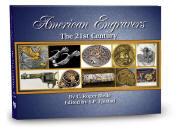
| |
OAK LEAF – A design, commonly engraved on German and Austrian
arms, consisting of oak leaves and acorns. Though most prevalent on
Germanic arms, engravers of other nationalities use this style
occasionally. In German, oak leaf decoration is called “Eichenlaubornament.”
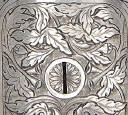
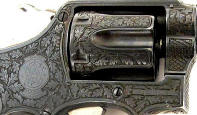
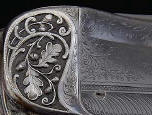
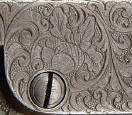
Pictured are examples of oak leaf engraving on four guns; an A. H. Fox,
Smith & Wesson, the bolster of a German shotgun, and oak leaves used as
part of a scroll design by Gustave Young.
|
OCCUPATIONAL ENGRAVER – An engraver who earns their entire
living as an engraver. A “full time” engraver, as opposed to a “part
time” engraver or hobby engraver.
|
OFF SHADING – A light cut or hairline spaced away from the
regular shade cut engraved into fill-in letters.
|
OMEGA – See:
LINDSAY OMEGA AIR CHASING GRAVER
|
ONGLETTE – A traditional style graver which when viewed from the
face has a profile resembling a boat hull in cross section. Onglettes
are also known as a “point” graver. Onglette graver blanks can be found
in sizes from #00000 to #8.


Pictured is an onglette graver blank and the face profile of an
onglette.
|
OPTIVISOR - A precision binocular headband magnifier
manufactured by Donegan Optical Company, Inc. of Lenexa, Kansas. Most
hand engravers, who are not using a microscope, utilize an OptiVISOR™
or a similar product while engraving. Among hand engravers, the term
optivisor is often used generically to refer to any headband binocular
magnifier.
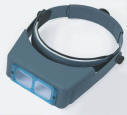
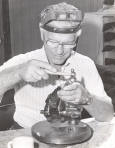
Pictured is an OptiVISOR™ and a photo of the late Neil Hartleip wearing
an OptiVISOR™ while working.
|
ORNAMENTAL ENGRAVING – The engraving of ornamental motifs,
scenes, and figures on items of utility such as armor, edged weapons,
flatware, guns, hollow ware, jewelry, and motor vehicle parts as
opposed to the engraving of plates for the printing of banknotes or
artistic prints.
|
ORNATO – Italian: Literally – adorned. Used by Italian gun
engravers to denote an ornate style of Italianate scrollwork.

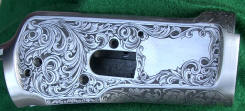
Pictured is an Italian O/U shotgun ornato engraved by Piardi and the
receiver of a Winchester model 1892 ornato engraved by Carl B. Bleile
of Cincinnati.
|
OUTLINING – A term used by hand engravers when referring to the
engraving of scroll backbones (spirals) and the outlines of the
flowers, leaves, and tendrils. Outlining is one of three basic tasks in
the engraving of ornamental designs. These three are: outlining,
shading, and backgrounding. There are styles of engraved ornamentation
that omit either backgrounding and/or shading. For instance sculpted
relief ornament is not shaded as shading is only a substitute for
actual relief. Flare cut scroll requires neither shading nor
backgrounding as the beveled outlining cuts create a relief appearance
that contrast with a plain background.
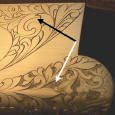
Pictured is a shotgun receiver in the process of being engraved. The
black arrow points to scrollwork that has been outlined and the white
arrow points to scrollwork that has been outlined and the background
removed. The next step will be the shading of the leaves with hatching
and cross-hatching.
|
OUTSIDE WORK – In reference to English fine scroll, the “outside
work” is the tiny engraved leaves and tendrils that form the outside
edge around the scrolls.
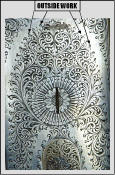
|
OVAL GRAVER – A graver which when viewed from the face is oval
in profile. Ovals are one of the least commonly used gravers. Oval
graver blanks come in sizes from #60 to #67.


Pictured is an oval graver blank and the face profile of an oval
graver.
|
OVERLAY – The process of attaching a precious metal design,
lettering, or figure to the surface of a metal object such as a belt
buckle, gun, knife, ring, or watch. This can be done by various
methods, including soldering, brazing, plating, or roughing the surface
with “teeth” and hammering on the overlay. Gun engravers cannot solder
on overlays if the gun is to be blued because the bluing salts can
damage the solder and cause the overlay to fall off.
|
|